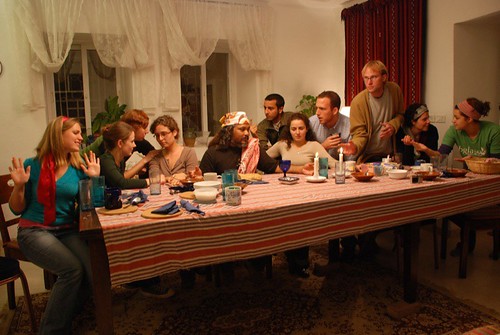Initially, and to some extent still, I feel frustration when these strikes take place. While it’s all well and good to show solidarity and passive resistance, on a practical level these strikes just hurt the Palestinians more. Families still need to buy bread and milk and baby formula, and with the Arab shops shut tight, the business simply crosses to the affluent Israeli half of town. Why not keep the small trickle of money in the Palestinian economy, which needs as much help as it can get?
Two weekends ago I attended a flamenco concert in Bethlehem. It was a full house when I arrived ten minutes late, and I and some friends I saw on the way in sifted throughout the audience into the few empty chairs. About an hour into the show a Palestinian man ran onto the stage and began shouting in Arabic at the audience. When he broke the microphone stand in half and the Spanish dance troupe ran off the stage I figured it wasn’t a planned intermission. When a swarm of men carrying semi-automatic rifles stormed into the hall I figured it was time to find a translator.
“Three men were killed by the Israelis in Bethlehem yesterday,” explained a man next to me. “He says it is a shame we are here celebrating when people are dead. If we don’t all leave there will be violence.” The audience was already up and pushing towards the exit while armed and unarmed men shoved and fought and babies cried among the chaos. I found my friends and we snaked our way through the panicked crowd and made it outside where we headed towards the checkpoint that would let us out of Bethlehem.
In some ways admirable and in some ways incredibly sad and useless, there is something in the society that will not allow for people to forget their fellow Palestinians. In a place where the killing, arrest or harassment of family, friends and neighbors is so frequent an occurrence, any measure of escapism seems like it could only help such a traumatized population. But some part of the culture insists that if others are suffering, one cannot forget that. Solidarity is a strong part of the resistance movement. As an American, I see money not going into a devastated economy and people not allowed to forget tragedy for an evening. To the Palestinians, this is a way to unify their people. Solidarity transcends the checkpoints, travel restrictions, and the Separation Wall that are breaking Palestine into an archipelago of unconnected and starving islands.
The Muslims and Jews are fighting, the Muslims and Muslims are fighting, so of course the Jews need to fight each other as well. The ultra-Orthodox Jews living in the neighborhood of Mea’a Shearim were rioting all of last week in protest of a gay pride parade scheduled for last Friday. There weren’t any gay rights activists in the vicinity during the week, but in protest, trash was spewed across the streets, electrical power boxes were destroyed, and cars were upturned and set aflame by angry ultra-Orthodox. In the end, the parade converted to a rally on a locked-down college campus because of all the death threats from various Orthodox Jews. Twenty-two thousand Israeli police were on duty last Friday to control any outbreaks of violence. From our vantage point on the Mount, we could see smoke billowing from the direction of Mea’a Shearim nearly every night, another SUV set ablaze.
A photo of a calmer, but no less bizarre evening:


Last Supper on the Mount of Olives. Millennia late, two disciples short.
